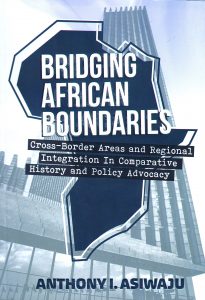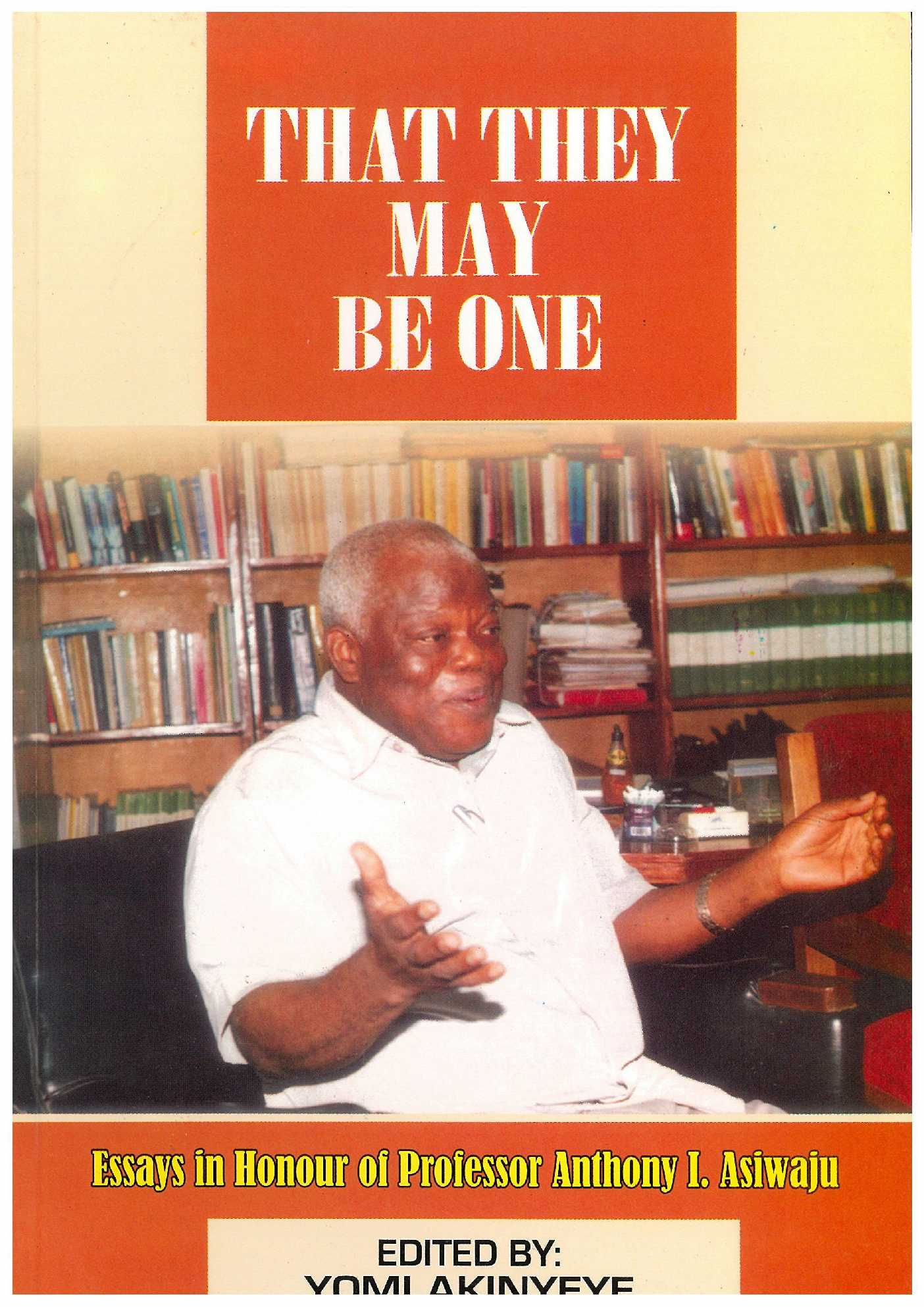Ahead of Thursday, July 7th, 2022 public presentation, Dr Chris M A Kwaja attempts to capture the soul of Prof Anthony Asiwaju’s newest book, Bridging African Boundaries: Cross-Border Areas and Regional Integration in Comparative History and Policy Advocacy. Dr. Kwaja is a Senior Lecturer / Researcher at the Centre for Peace and Security Studies, Modibbo Adama University, Yola, Adamawa State in Nigeria. He currently represents Africa as a Member of the United Nations Working Group on Mercenaries.

Front cover of the new text by Prof Asiwaju
Introduction and Context
The 918 page-book recently published by the Pan-African University Press, Austin, Texas, USA, titled “Bridging Africa Boundaries: Cross-Border Areas and Regional Integration in Comparative History and Policy Advocacy”, is the most current contribution of Africa’s doyen of border studies, Emeritus Professor, Anthony I. Asiwaju, to the vexed and compelling issue of border studies in Africa.
The study is an assemblage of three books, all of which made 43 witty chapters, 918 pages and a 12-page index, which represents a captivating legacy of the author’s contribution on Africa’s border history and studies, with a strong dose of policy advocacy for integration and peaceful coexistence among people across bordered societies and countries in Africa.
The book considers very closely the relationships across and between sovereign state and nations territories and their territorial sovereignty and possessions; both spatial and land bordered issues are vividly mapped-out in this contemporary historic compendium sensitive for policy enactment and studies on the domains (history cum policy). The major concern of the book paralleled three dimensions – a Yoruba land under a European rulership, West Africa transformation and boundaries cum Africa integration

A component of the new world
The first book on “Western Yorubaland under European Rule” published in 1976, was Professor Asiwaju’s doctoral thesis at University of Ibadan, which he defended in 1971. This very thesis laid the foundation for his voyage in the field of border studies, cross border and integration of persons across bordering states and policy. The book examined the European and in particular French colonial systems which were the major or dominant western characters in Africa at the time. It bore major emphasis among others, on comparing British and French colonial rules and their behaviours towards Africans, chiefs and traditional heads, governance, tax, freedom, agriculture, missionary activities, education and Africa elites. He conducted this research under two headings: comparative history and borderland policy. In his comparison between the British and French colonialism, he was able to draw their policy difference, similarities and utility in Africa context and beyond . His conclusion was to the effect that the British were in essence more hospitable and friendly than the French and he supposedly inferred this conclusion from the indigenous responses and reactions towards the two European forces.
The second book titled “West African Transformations: Comparative Impacts of French and British Colonialism”, which was published in 2001, arose from the need for comparative historical perspectives on the sameness and different styles of French and British colonialism, as well as the localised impacts of the governance in West Africa particularly on the comparative history of African cross-border areas. Written at a period when the author was more concerned on fiscal border policy from about 1970-1978 but are taken together and published in 2001. The book, which enlarged and improved upon the scope of book one, deals on colonial method and Africans response. It encompassed the European coercion system and the French institutionalization of penal code for repression hence the book maintained as its focal emphasis

The work that can be said to have brought Prof Asiwaju to limelight
The third book “Boundaries and African Integration : Essays in Comparative History and Policy Analysis”, was a compendium of several texts that was assembled by Professor Asiwaju with the goal of providing a pathway for innovation and initiatives relating to policies on border and integration as well as implementation processes in Africa, Nigeria and other bordering Africa countries. The book bears out an overview of the inter link between boundaries politics, peace and security related concerns and ways toward a sustained coordination and development. The author was categorical regarding the positiveness of European historic experience for Africans, which he viewed as developmental.
Conclusion:
The three books, as summed up above, represents an uncommon attempt by Professor Asiwaju to analyse key aspects of Africa’s rich history, with emphasis on the historicity of the continent’s borders as well as the role and place of policy in bridging African boundaries in the search for integration. On the whole, this compendium adopts a very creative approach to the topics it examined by invoking the expertise of the author as an astute Professor of History in framing his thoughts and arguments. In doing so, the author did not hide his bias for the positive influence of the British systems on African politics during and after colonialism, unlike the French coercive rule, which he viewed as harsh on Africans.
As someone with rich experience of scholarship and policy, Professor Asiwaju is an individual that has effectively deployed his expertise as both a man of science and a man of affairs. As a man of science, his teachings and ground breaking research in the field of border studies have earned him the revered title of the Father of African Border Studies. As a man of affairs, he has served in key policy-level positions in Nigeria and beyond, which gave him an opportunity to put to practice, some of his ideas on how to design and implement policies around borders in ways that harnesses and sustains the richness of Africa’s culture and diversity in the pursuit of integration.




























